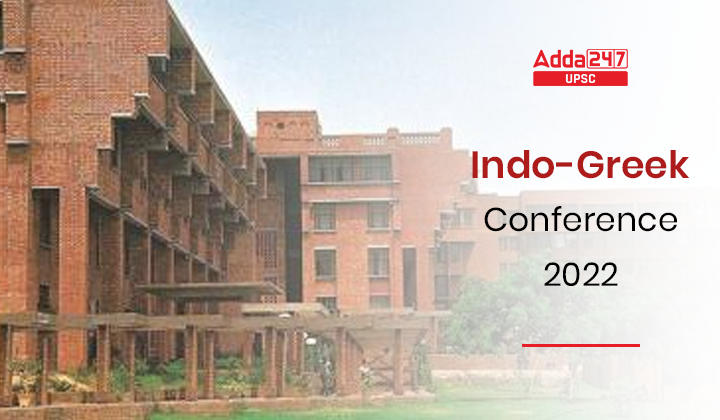Table of Contents
Relevance of Indo-Greek Conference 2022 for UPSC
Indo-Greek Conference 2022: Indo-Greek Conference 2022 has a great significance from the perspective of the UPSC International Relations Section(GS 2).
Indo-Greek Conference 2022 is also an essential current affairs cum Indian History, Art, and Culture topic for both UPSC prelims and mains(GS 1).
What is Bali Yatra of Odisha? | Significance for UPSC
Why Indo-Greek Conference 2022 is in News?
- To explore the vibrant history of Indo-Hellenic culture and linkages, Greece is organising the International Indo-Greek Conference in New Delhi from today, December 12.
- The five-day conference on ’Greek World and India: History, Culture and Trade from the Hellenistic period to Modern Times’ is being held at Jawaharlal Nehru University (JNU).
India’s Historical Linkage with Greece
- Throughout the history of humanity, Hindu and Greek Mythology are the most renowned for the Gods and Goddesses it has blessed the world with.
- These are the exceptional cultures which have sustained the test of time and remain unrivaled throughout the earth.
- Many scholars and researchers find it contemporary significant.
- The presence of abundant literary and archaeological artifacts have led to the establishment of Indo-Hellenic discussions.
Greeks are known as invaders in India
- It is widely accepted that contacts between the Greek world and India pertain mainly to Antiquity, starting with Alexander.
- So, the Conference also highlights other periods of interaction the Middle Ages or the early Modern Times- proving that India remained within the horizon of the Greeks as a cultural and economic beacon.
What does the Indo-Greek Conference Aims?
- The Indo-Greek conference aims to build dialogue and understanding between the Greek world and India from the period when the culture was at its peak and until the modern times.
- The conference will mainly focus on history and linkages, art and archeology, science and philosophy, trade and economics, Hellenistic India – Greek Kings of India, Greeks in Indian Literature, Indians in Greek Literature (Ancient, Byzantine, and Post-Byzantine).
- The five-day event will also include a digital exhibition of rare Byzantine manuscripts, including numerous miniatures depicting the life of Alexander.
What was Hellenistic India?
- Hellenistic India was the period of Indo-Greek Kingdoms which hugely influenced Indian Polity & Culture of that period.
- The Indo-Greek kingdom was ruled by over 30 Hellenistic (Greek) kings in the northwest and north India from the 2nd century BC to the beginning of the first century AD.
- The kingdom started when Graeco-Bactrian king Demetrius (son of Euthydemus I) invaded India around 180 BC. He conquered southern Afghanistan and parts of Punjab.
- The Indo-Greek kings imbibed Indian culture and became political entities with a mix of Greek and Indian culture.
- For about 25 years, the Indo-Greek kingdoms were under the Euthydemid rule.
- Many coins have been unearthed of these kings and most of the information we get about them is from these coins.
- Most of the Indo-Greek kings were Buddhists and Buddhism flourished under their rule.
- Greek influence is mostly seen in art and sculpture, particularly the Gandhara School of art.
Who was Menander?
- Menander I (165 BCE- 145 BCE) was a famous Indo-Greek King.
- The Milinda Panha (composed around 100 BC) records a dialogue between Menander and the Buddhist sage Nagasena. Originally written in Sanskrit, only the Pali version is available now. In the work, Menander is described as a wise, learned, and able king. At the end of it, Menander accepts Buddhism and converts.
Modern Indo-Greek Economic ties are Gaining the Momentum
- S. Jaishankar visited Athens in 2021 and his counterpart, Greek Foreign Minister Nikos Dendias came to New Delhi this year.
- Greece has announced that Indian students will be given priority for scholarships under a ‘Study in Greece’ programme.
- While there are as yet no direct flights connecting India and Greece, Greek Tourism Minister Harry Theoharis had said in October last year that a direct flight between Athens and India will be started, in view of the large number of Indians who travel to Greece for leisure.
- In a bid to expand economic ties between the two countries, the Greek deputy minister for economic diplomacy and openness, Konstantinos Fragkogiannis, is scheduled to lead a large trade and business delegation to India in early 2023.
FAQs on Indo-Greek Conference 2022
Q. What is Indo-Greek Conference 2022?
Indo-Greek Conference 2022 is a five-day conference titled ’Greek World and India: History, Culture and Trade from the Hellenistic period to Modern Times’ held at Jawaharlal Nehru University (JNU).
- The Indo-Greek kingdom was ruled by over 30 Hellenistic (Greek) kings in northwest and north India from the 2nd century BC to the beginning of the first century AD.
- Graeco-Bactrian king Demetrius invaded India around 180 BC and conquered parts of Afghanistan and Punjab.
- The last Indo-Greek king was Strato II.
- Their rule in India ended with the invasions of the Indo-Scythians (Sakas).
Economy Current Affairs:
IR Current Affairs:
Editorial Analysis:




 TSPSC Group 1 Question Paper 2024, Downl...
TSPSC Group 1 Question Paper 2024, Downl...
 TSPSC Group 1 Answer key 2024 Out, Downl...
TSPSC Group 1 Answer key 2024 Out, Downl...
 UPSC Prelims 2024 Question Paper, Downlo...
UPSC Prelims 2024 Question Paper, Downlo...
